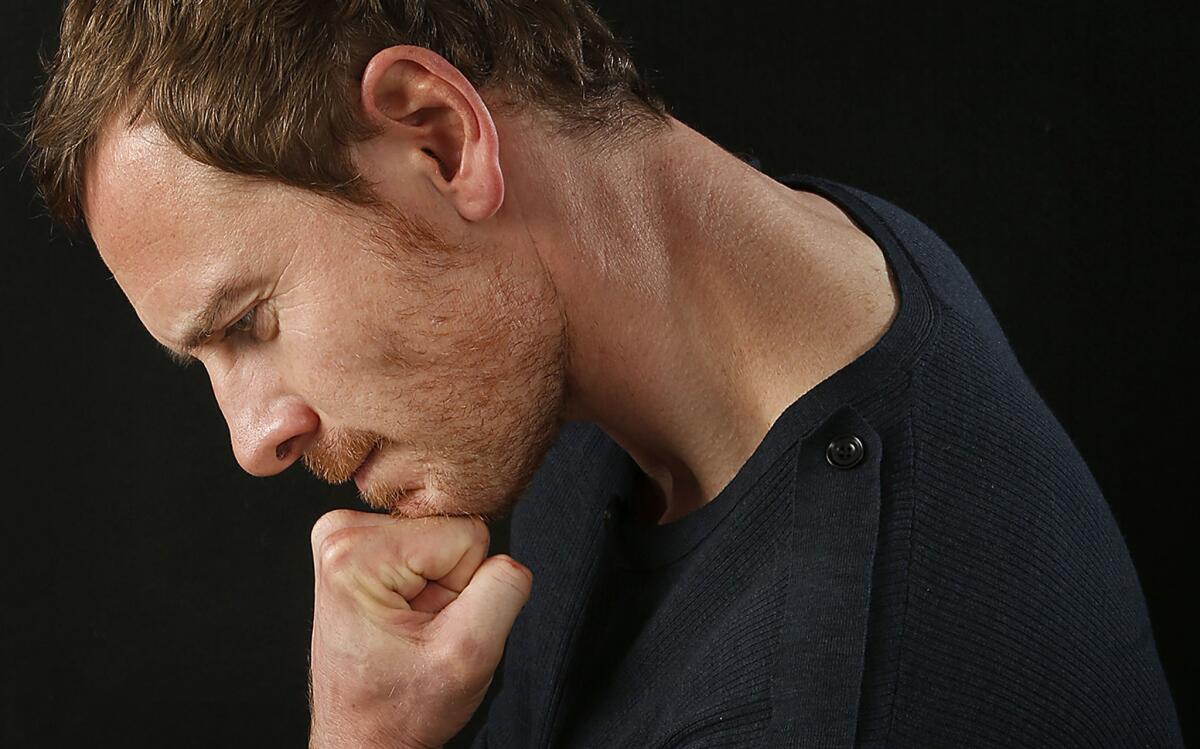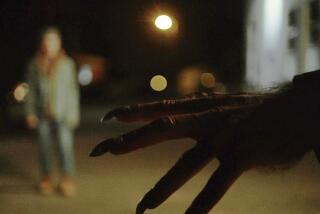Michael Fassbender keeps pushing himself

TORONTO — In the historical drama “12 Years a Slave,” Michael Fassbender plays brutal and impulsive slave master Edwin Epps. Since its October release, the film has earned critical acclaim in nearly equal measure with warnings about its unflinching portrayal of plantation conditions. It is Fassbender’s scenes that provoke much of that cautioning. In a performance that already has critics talking about an Oscar for the German-born, Ireland-raised actor, Epps rapes, whips and otherwise terrorizes his “property” at every turn.
The film, Fassbender’s third collaboration with British director Steve McQueen following IRA prison movie “Hunger” and sex addiction drama “Shame,” premiered at the Toronto International Film Festival, where the actor with the piercing blue eyes sat down with The Envelope to discuss why McQueen was the director he’d been looking for and about trying to find the humanity — and buffoonishness — in a slave owner.
PHOTOS: Michael Fassbender’s career in pictures
What’s special about your relationship with McQueen?
He draws the best work out of me. When I was 17 and started doing this, that was the pinnacle — to find a director who could unlock various things within me and take me to places I couldn’t get on my own. That’s what you’re looking for, someone you can trust implicitly and therefore journey with.
McQueen’s films have a strong, exacting visual component. How does that affect the way you work on set?
That’s the great thing about Steve and [cinematographer] Sean Bobbitt’s relationship. They’ve been working together for 13 years. They don’t storyboard stuff. I’m sure they have ideas they discuss, but there’s a great freedom in terms of the movement that I’ll have. That dance with the cameraman and the lens is so important. It’s crucial for an actor, where something happens and he’s there to capture it. It’s not like, “Do that again. I almost got it.” He gets it, so then it’s done. Once you reproduce it, it’s only ever going to be a reproduction. In the whipping scene with Patsey, Sean pans the camera over just in time for me to pull the pistol out of Andy Dylan’s holster, it’s just a great moment.
PHOTOS: Scenes from ’12 Years a Slave’
Although Epps is brutal, there’s something sloppy about him, the way he’ll talk to the slaves with his unbuttoned cuffs dangling from his wrists.
It’s the boredom. What do you on the plantation all day, day after day? Obviously, it’s one reality for the slaves and another for him. I wanted to show that there’s a normality, in terms of the slave world, outside of Epps’ plantation [where] it’s unpredictable and terrifying. You don’t know where the next assault is coming from. It heightens that sort of terror.
When the slaves come back from Judge Turner’s, Steve was like, “What do you think if you don’t have your pants on?” I was like, “That’s great, and maybe we should have something else, like the little girl.” It says so much with him holding her hand, not wearing pants: He’s priming the next Patsey. So you find those little elements that add to the character and tell things without any exposition.
There’s a scene where you’re reading to the slaves from the Gospel of Luke, telling them it’s about obeying their master. But that passage is actually a parable about a person’s relationship to God.
There’s a buffoon quality to him, and that allows the audience to not be numb to him. It allows them to snicker at him, and then next you see him do something which is terrifically horrible. It allows you to open up to him as a human being. He’s not the smartest, and you see that in the opening speech.
He’s not the Hannibal Lecter of slave owners.
He’s a pretty simple character. He’s so in love with Patsey, and he doesn’t have the intellect to deal with that. Therefore he sets about trying to destroy her, to destroy that feeling inside of himself. He’s lost. That’s an element about him which, in a way, amongst all the brutality, draws some element of sympathy. It’s like he is a victim of the times as well.
More to Read
Only good movies
Get the Indie Focus newsletter, Mark Olsen's weekly guide to the world of cinema.
You may occasionally receive promotional content from the Los Angeles Times.










